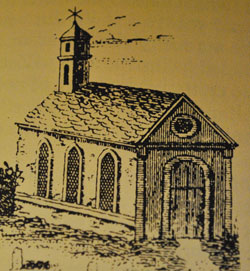
We have covered rites of passage marked by colonial churches—birth, initiation and marriage. The last one is death and there is more written on it so we will cover half of it this week.
Colonial Virginians encountered death regularly. For people who survived to age 20, life expectancy in Virginia and Maryland was between 23 and 29 additional years, so average age at death was mid-to late 40s which is half our own. Women died at a more frequent rate than men (due to malaria) between the ages of 15-40, which are consequently the typical childbearing years. People died at home and were often buried there in contrast with today.
Epidemic diseases often ran rampant among the settlers. Yellow fever, small pox, measles and even the bubonic plague were diseases feared by the settlers. Infant mortality was high among the colonists and there were few trained doctors for those needing medical attention. All too often, a young wife would die when complications occurred during childbirth.
Due to this trend, the laws allowed people to get an earlier start in creating wills. Any male aged 14 or more, or unmarried females aged 12 or more, could make a will to bequeath personal property. However, only persons over 21 could devise land in a will. Married women could not make wills.
Wills tell us about attitudes toward death in this period. Death was constantly described in theological language. They characteristically opened with a statement like that penned by William Byrd I: "First I bequeath my soul to God that gave it hopeing thro the merits & mediation of my ever blessed saviour & redeemer Jesus Christ to obtain pardon and remission of all my sins and to inherit life everlasting. I bequeath my body to the ground to be decently buryed."
The Anglicans in Va. consciously distinguished her or his "spiritual goods or inward estate" from "the material goods or outward estate," thus enabling "the dutiful to cross the boundary between the everyday material world and the transcendental spiritual world of the Christian afterlife." Death was the great demarcation between the material and spiritual worlds, returning the soul to God. Sermons were preached that preparation for death was a lifelong process.
In statements of death, there was the key notion of divine providence and confident hope about the resurrection which provided solace. The death of her husband Mary Bland Lee told her brother, "is so great an affliction to me, that I han’t words to express it." Nevertheless, she did find words: "I know it is my duty as a christian, to bear patiently whatever happens to me, by the alotment of divine providence, and I humbly beseech Almighty God, to grant me his grace, that I may be enabled to submit patiently, to whatever trialls it may please him to lay on me…but that I may bear them as a good christian, with courage and resolution, with calmness and resignation, and that I may resign this life with joy and comfort, when it pleaseth God to remove me, and may have a well-grounded hope in his mercy through the merits and interseshun of our dear Saviour and merciful Redeemer”
Statements dealing with spouses were also based on a relationship with God. In her account of Mr. Fletcher’s death Mary Fletcher spends almost the entire time speaking about their relationship with each other in respect to God. She shows how great of an impact the church has on life in general (Fletcher). She demonstrated this by writing the following: “For some time before this last illness, his precious Soul (always alive to God) was particularly penetrated with the nearness of eternity; there was scarce an hour in which he was not calling upon me to drop every thought and every care, that we might attend nothing but drinking deeper into God”
